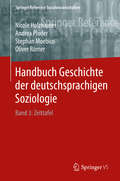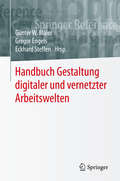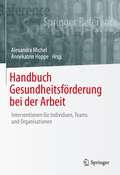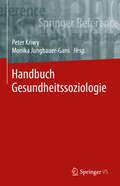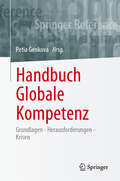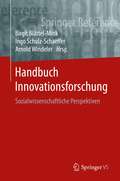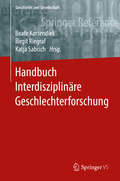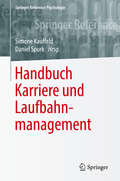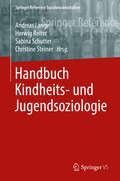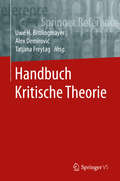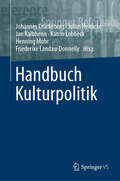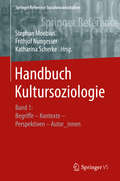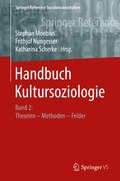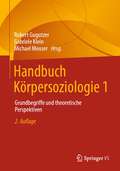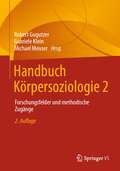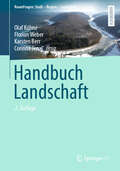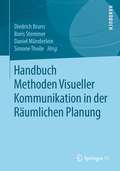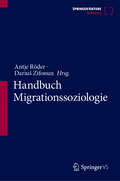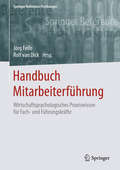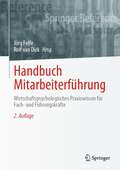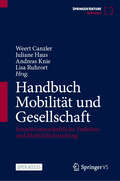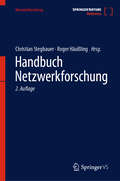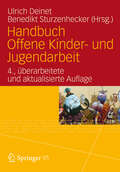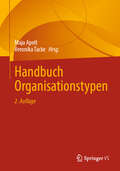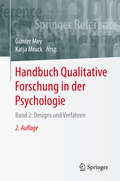- Table View
- List View
Handbuch Geschichte der deutschsprachigen Soziologie: Band 2: Forschungsdesign, Theorien Und Methoden (Springer Reference Sozialwissenschaften Ser.)
by Stephan Moebius Andrea Ploder Nicole Holzhauser Oliver RömerWer sich einen Überblick über die Geschichte der deutschsprachigen Soziologie und über soziologiehistorische Konzepte und Methoden verschaffen möchte, wird in diesem Handbuch umfassend fündig. Band 3 fasst zentrale sozial- und ideengeschichtliche Ereignisse der Fachgeschichte in Deutschland, Österreich und der Schweiz in einer Chronologie zusammen. Die so entstehende Zeittafel bettet einzelne Themen in größere fachhistorische Kontexte ein und trägt durch das Aufzeigen von Gleichzeitigkeiten bzw. Ungleichzeitigkeiten dazu bei, neue Forschungsprobleme und -fragen sichtbar zu machen und einer Klärung zuzuführen.
Handbuch Gestaltung digitaler und vernetzter Arbeitswelten (Springer Reference Psychologie Ser.)
by Gregor Engels Günter W. Maier Eckhard SteffenDieses interdisziplinäre Handbuch richtet sich an all diejenigen, die den digitalen Wandel, der im Zusammenhang mit der vierten industriellen Revolution (Industrie 4.0) diskutiert wird, in Betrieben, Verwaltungen und der Gesellschaft besser verstehen und aktiv gestalten möchten. Die einzelnen Beiträge veranschaulichen die vielfältigen Perspektiven unterschiedlicher Disziplinen (z.B. Ingenieur-, Rechts- und Wirtschaftswissenschaften, Informatik, Psychologie, Soziologie, Erziehungswissenschaft u.a.) oder Interessensgruppen (z.B. Gewerkschaften) auf die Folgen der Digitalisierung im Arbeitsleben für Mensch, Organisation und Gesellschaft. Das gesamte Werk schlägt eine Brücke von aktuellen Forschungsergebnissen hin zu praktischen Umsetzungshinweisen. Im Zentrum stehen drei zentrale Fragen zur Digitalisierung des Arbeitslebens, und zwar woran man sich bei der Gestaltung orientieren, wie die Transformation gestaltet werden und worauf sich die Digitalisierung auswirken kann. Beispielthemen dieser 3 Bereiche: 1. Im Zusammenhang mit den Gestaltungskriterien: sichere und gesundheitsförderliche Gestaltung der digitalen Arbeitsweltarbeitsrechtliche Aspektepsychologische Arbeitsgestaltung digitaler Arbeitswelten 2. Im Zusammenhang mit der Art und Weise des Wandels von analogen zu digitalen Arbeitswelten: Chancen für gesundheitsorientierte Arbeitsgestaltung durch körpernahe und tragbare Sensorik neue Aufgabenverteilung durch kollaborative Roboter im Rahmen der Mitbestimmung Prozesse durch proaktive betriebliche Interessensvertretung gestalten 3. Im Zusammenhang mit den Konsequenzen: Auswirkungen digitaler Arbeitswelten auf die Beschäftigungsstrukturen und das Privatleben Möglichkeiten dieser Entwicklung für die Inklusion älterer Menschen oder Menschen mit Behinderung ZielgruppenAnwender/innen und Entwickler/innen digitaler Technologien, Führungskräfte, Personalleiter/innen und Entscheidungsträger/innen in Unternehmen, Verbänden und der Politik
Handbuch Gesundheitsförderung bei der Arbeit: Interventionen für Individuen, Teams und Organisationen
by Alexandra Michel Annekatrin HoppeIn diesem Herausgeberwerk werden Interventionsansätze zur Gesundheitsförderung bei der Arbeit vorgestellt. Dabei wird differenziert zwischen personenbezogenen Interventionen, die am Individuum ansetzen, und bedingungsbezogenen Interventionen, die an Arbeitsbedingungen und Arbeitsumfeld ansetzen. Herausforderungen für die Gestaltung, Bedingungen für die Wirksamkeit sowie die Bedeutung von Evaluation von Interventionen werden beleuchtet und kritisch diskutiert. Zudem wird gezeigt, an welchen Stellen noch Forschungs- und Interventionsbedarf besteht, um Personen zu befähigen, ihre Arbeit gesundheitsförderlich zu gestalten. Ebenso wird aufgezeigt, welche Maßnahmen Organisationen zur Gesundheitsförderung ergreifen sollten.
Handbuch Gesundheitssoziologie (Springer Reference Sozialwissenschaften Ser.)
by Monika Jungbauer-Gans Peter KriwyDas Handbuch leistet einen Überblick zu zentralen Themen der Gesundheitssoziologie. Die Abschnitte berücksichtigen dabei die Ebene der handelnden Akteure (Mikroebene), die Mesoebene der Organisationen sowie die Makroebene der Gesundheitssysteme und Gesundheitspolitik. Zudem werden internationale Vergleiche aufgezeigt. Ziel der einzelnen Beiträge ist es, sowohl die theoretischen Grundlagen eines Themas darzustellen als auch eine Übersicht zum Forschungsstand zu liefern. Die Beiträge eignen sich daher insbesondere für eine Einführung in die Themen im Rahmen der Lehre, aber auch als Ausgangspunkt für vertiefende Forschung. Zielgruppen des Handbuchs sind Forschende und Studierende der Soziologie mit Schwerpunkt Gesundheitsforschung, Gesundheits- und Medizinsoziologie, Public Health, Sozialen Arbeit, Epidemiologie, Sozialpsychologie oder der angrenzenden Disziplinen im Themenfeld Gesundheit.
Handbuch Globale Kompetenz: Grundlagen - Herausforderungen - Krisen
by Petia GenkovaZiel des Handbuches ist es, den wissenschaftlichen Forschungsstand zum Thema ‚Globale Kompetenz‘ praxisorientiert darzustellen. Globale Kompetenz beschreibt die Fähigkeit einer Person, weltweit effektiv und positiv mit seinen Mitmenschen umgehen sowie Krisen und Herausforderungen bewältigen zu können. Global kompetente Personen sind offen gegenüber kulturellen Normen und akzeptieren hierdurch geprägte Erwartungen, zum Beispiel hinsichtlich der Sprache, Gestik, Verhaltens- und Umgangsformen, Höflichkeit und Werten. Die Themen orientieren sich an den drei Säulen der Globalen Kompetenz: Nachhaltigkeit, interkulturelle Kompetenz und soziale Verantwortung in einer multi- und interdisziplinären Perspektive aus Psychologie, Soziologie, Politikwissenschaft und den Wirtschaftswissenschaften.
Handbuch Innovationsforschung: Sozialwissenschaftliche Perspektiven
by Birgit Blättel-Mink Ingo Schulz-Schaeffer Arnold WindelerDas Handbuch erörtert umfassend das komplexe Gebiet der sozialwissenschaftlichen Innovationsforschung. Es ordnet die Innovationsforschung geschichtlich, begrifflich und vom Gegenstand her ein. Es präsentiert etablierte und sich neu herausbildende theoretische Ansätze der sozialwissenschaftlichen Innovationsforschung. Und es informiert über empirische Befunde und Entwicklungen aus einer Vielzahl von Bereichen und Feldern der Innovation.
Handbuch Interdisziplinäre Geschlechterforschung (Geschlecht und Gesellschaft #65)
by Birgit Riegraf Beate Kortendiek Katja SabischDas Handbuch bietet einen systematischen Überblick über den Stand der Geschlechterforschung. Disziplinäre und interdisziplinäre Zugänge werden verknüpft und vielfältige Sichtweisen auf das Forschungsfeld eröffnet. Die Beiträge der Geschlechterforscher_innen aus unterschiedlichen Fachdisziplinen spannen die Breite des Forschungs- und Wissenschaftsfeldes auf. Hierdurch werden die Debatten, Analysen und Entwicklungen der deutschsprachigen und internationalen Geschlechterforschung deutlich.Das Handbuch Interdisziplinäre Geschlechterforschung ist in sieben Schwerpunkte gegliedert und besonders in Lehre und Forschung einsetzbar.
Handbuch Karriere und Laufbahnmanagement (Springer Reference Psychologie Ser.)
by Simone Kauffeld Daniel SpurkDieses Handbuch bietet einen interdisziplinären Einblick in verschiedene Forschungs- und Anwendungsfelder des Laufbahnmanagements sowie der Karriereplanung. Die thematische Bandbreite der einzelnen Beiträge reicht von der Berufswahl über die Laufbahnentwicklung, Laufbahnphasen, Laufbahnerfolg, Laufbahnberatung, Karriereentwicklung in Organisationen bis hin zu Austritt aus dem Erwerbsleben, Karriere-Coaching und weiteren Themen. Jedes Thema wird einheitlich gegliedert vorgestellt: Auf ein verständliches Fallbeispiel folgen Hinweise zur aktuellen Relevanz des Themas, ein Überblick über den aktuellen Forschungsstand sowie ein Fazit für die Praxis. Damit liegt ein gleichzeitig fundiertes wie praxisnahes Handbuch für Personaler, Laufbahnberater, Wissenschaftler und Studierende vor.
Handbuch Kindheits- und Jugendsoziologie (Springer Reference Sozialwissenschaften Ser.)
by Andreas Lange Herwig Reiter Sabina Schutter Christine SteinerIm Handbuch werden die wichtigsten gesellschaftlichen Bedingungen und Entwicklungen des Aufwachsens und Erwachsenwerdens von Kinder und Jugendlichen dargestellt. Neben den theoretischen Implikationen des Verständnisses von Kindheit und Jugend werden auch konkrete Forschungsfelder und methodische Herangehensweisen an kindheits- und jugendsoziologische Themen vorgestellt.
Handbuch Kritische Theorie: Alte Und Neue Auswege? (Springer Reference Sozialwissenschaften Ser.)
by Tatjana Freytag Uwe H. Bittlingmayer Alex DemirovićDas Handbuch Kritische Theorie beleuchtet aus ganz unterschiedlicher Perspektive, was Kritische Theorie heute bedeuten kann. Das Handbuch reklamiert, trotz seines Umfangs, keine eindeutige oder definitorische Antwort auf die Frage, was Kritische Theorie heute ist oder zu sein hat. Die Programmatiken Kritischer Theorie sind in den letzten 85 Jahren weder konstant geblieben noch lässt sich Kritische Theorie auf die Interpretation eines Kanons von Texten festlegen. Gleichwohl sind Kritische Theorie und die Bezugnahmen auf sie nicht beliebig, sondern, so die Überzeugung der Herausgeber*in, bei allen Auseinandersetzungen um die richtige Interpretation und institutionelle Praxis, mehr als eine „bloße Metapher“. Im Zentrum steht nach wie vor die Diskrepanz zwischen dem Ausmaß an real vorhandenen und in gesellschaftliche Institutionen gegossenen Herrschaftsverhältnissen einerseits und den Möglichkeiten der (radikalen) Verringerung von Herrschaft von Menschen über sich, über andere und über Natur andererseits. In diesem Grundverständnis sind sich – bei aller Heterogenität – die im Handbuch versammelten Beiträge und Beitragenden einig.
Handbuch Kulturpolitik
by Henning Mohr Johannes Crückeberg Friederike Landau-Donnelly Julius Heinicke Jan Christopher Kalbhenn Katrin LohbeckDas Handbuch bietet einen Überblick über den aktuellen Stand der Kulturpolitik und Kulturpolitikforschung in Deutschland. Aus verschiedenen Perspektiven werden die historischen Entwicklungen, Theorie(n) der Kulturpolitik und aktuelle Herausforderungen der Praxis erörtert. Darüber hinaus informiert das Handbuch über die Methoden der Kulturpolitikforschung und Positionen in unterschiedlichen Wirkungsfeldern.
Handbuch Kultursoziologie: Band 1: Begriffe – Kontexte – Perspektiven – Autor_innen (Springer Reference Sozialwissenschaften)
by Stephan Moebius Frithjof Nungesser Katharina ScherkeDie Vielfalt kultursoziologischer Ansätze, Diskurse, Arbeitsfelder und Methoden wird in diesem Handbuch kompakt dargestellt. Geboten wird damit die Möglichkeit zur Orientierung innerhalb des heterogenen Feldes der Kultursoziologie. Unterschiedliche Positionen und das mit ihnen jeweils verbundene Verständnis von ‚Kultur‘ werden sichtbar gemacht und die Leser_innen zur weiterführenden Auseinandersetzung mit diesem Forschungsfeld eingeladen.Band 1 des Handbuchs widmet sich dem Begriff der Kultur, der Kontextualisierung des Themenfeldes ‚Kultursoziologie‘ im interdisziplinären Umfeld, seiner Entwicklung und gegenwärtigen Ausformung in unterschiedlichen Weltregionen sowie zentralen kultursoziologischen Autor_innen.
Handbuch Kultursoziologie: Band 2: Theorien – Methoden – Felder (Springer Reference Sozialwissenschaften)
by Stephan Moebius Frithjof Nungesser Katharina ScherkeDie Vielfalt kultursoziologischer Ansätze, Diskurse, Arbeitsfelder und Methoden wird in diesem Handbuch kompakt dargestellt. Geboten wird damit die Möglichkeit zur Orientierung innerhalb des heterogenen Feldes der Kultursoziologie. Unterschiedliche Positionen und das mit ihnen jeweils verbundene Verständnis von ‚Kultur‘ werden sichtbar gemacht und die Leser_innen zur weiterführenden Auseinandersetzung mit diesem Forschungsfeld eingeladen.Band 2 gibt Einblick in theoretische und methodische Ansätze der Kultursoziologie und präsentiert den derzeitigen Stand kultursoziologischer Forschung zu ausgewählten Gegenstandsbereichen.
Handbuch Körpersoziologie 1: Grundbegriffe und theoretische Perspektiven
by Robert Gugutzer Gabriele Klein Michael MeuserDas Handbuch Körpersoziologie verfolgt das Ziel, den grundlegenden Stellenwert des Körpers für soziologisches Denken zu veranschaulichen. Die Körpersoziologie begreift den Körper als bedeutsam für subjektiv sinnhaftes Handeln sowie als eine soziale Tatsache, die hilft, Soziales zu verstehen und zu erklären. Der Körper ist Produzent und Effekt des Sozialen, er ist gesellschaftliches und kulturelles Symbol wie auch Agent, Medium und Instrument sozialen Handelns. Die Körpersoziologie analysiert, wie soziale Strukturen sich in den Körper einschreiben, soziale Ordnung in körperlichen Handlungen und Interaktionen hergestellt und sozialer Wandel durch körperliche Empfindungen motiviert sowie durch körperliche Aktionen gestaltet wird. Körpersoziologie ist in diesem Sinne als verkörperte Soziologie aufzufassen. Das zweibändige Handbuch Körpersoziologie dokumentiert das breite Spektrum an körpersoziologischen Perspektiven und Ansätzen sowie den aktuellen Status Quo der Körpersoziologie. Band 1 präsentiert eine Übersicht zentraler körpersoziologischer Grundbegriffe sowie die Perspektiven einer Vielzahl soziologischer Theorien auf den Körper.
Handbuch Körpersoziologie 2: Forschungsfelder und methodische Zugänge
by Robert Gugutzer Gabriele Klein Michael MeuserDas Handbuch Körpersoziologie verfolgt das Ziel, den grundlegenden Stellenwert des Körpers für soziologisches Denken zu veranschaulichen. Die Körpersoziologie begreift den Körper als bedeutsam für subjektiv sinnhaftes Handeln sowie als eine soziale Tatsache, die hilft, Soziales zu verstehen und zu erklären. Der Körper ist Produzent und Effekt des Sozialen, er ist gesellschaftliches und kulturelles Symbol wie auch Agent, Medium und Instrument sozialen Handelns. Die Körpersoziologie analysiert, wie soziale Strukturen sich in den Körper einschreiben, soziale Ordnung in körperlichen Handlungen und Interaktionen hergestellt und sozialer Wandel durch körperliche Empfindungen motiviert sowie durch körperliche Aktionen gestaltet wird. Körpersoziologie ist in diesem Sinne als verkörperte Soziologie aufzufassen. Das zweibändige Handbuch Körpersoziologie dokumentiert das breite Spektrum an körpersoziologischen Perspektiven und Ansätzen sowie den aktuellen Status Quo der Körpersoziologie. Band 2 versammelt Beiträge zu soziologischen Forschungsfeldern und methodischen Zugänge und belegt damit die soziologische Relevanz des Körpers unter erkenntnis- und sozialtheoretischen, methodologischen und methodischen Gesichtspunkten.
Handbuch Landschaft (RaumFragen: Stadt – Region – Landschaft)
by Olaf Kühne Corinna Jenal Florian Weber Karsten BerrDieses Handbuch präsentiert unterschiedliche Perspektiven auf Landschaft und zeigt die Disziplinen mit ihren Landschaftsverständnissen auf. Ziel ist es, einen Überblick über den aktuellen Stand der Landschaftsforschung zu geben und gleichzeitig die Zukunft der Landschaftsforschung zu beleuchten. Die Autor*innen sind Expert*innen auf ihren Gebieten und im deutschen Sprachraum einschlägig bekannt.
Handbuch Methoden Visueller Kommunikation in der Räumlichen Planung
by Diedrich Bruns Simone Theile Boris Stemmer Daniel MünderleinUm den aktuellen Stand des Wissens und der Anwendung von Methoden visueller Kommunikation aus unterschiedlichen Blickwinkeln zu beleuchten, steuern Autoren aus Wissenschaft und Praxis Beiträge zu diesem Sammelband bei. Sie arbeiten dabei aktuelle Herausforderungen in Bezug auf die visuelle Kommunikation und dazu einschlägige Methoden heraus, um entsprechende Zukunftsperspektiven der räumlichen Planung und insbesondere der Landschaftsplanung bzw. Landschaftsarchitektur aufzuzeigen. Ein solcher Überblick über die visuellen Methoden in der räumlichen Planung ist bisher einzigartig. Neben den eher traditionellen Methoden wie z.B. Modellen und Zeichnungen liegt ein Schwerpunkt in der Betrachtung des Umbruchs der Medienlandschaft, der auch der räumlichen Planung völlig neue Möglichkeiten der Kommunikation eröffnet. So wird die visuelle Kommunikation der Disziplin auch verstärkt Gegenstand einer eigenständigen Forschung, die sich vielfach auf Methoden angrenzender Disziplinen stützt und damit interdisziplinär agiert.
Handbuch Migrationssoziologie
by Antje Röder Dariuš ZifonunDas Handbuch eröffnet einen umfassenden Überblick zum Stand der Forschung in der Migrationssoziologie. Es bietet eine Übersicht über die verschiedenen theoretischen und methodischen Zugänge und entfaltet in den weiteren Abschnitten die migrationssoziologisch relevanten Felder.
Handbuch Mitarbeiterführung
by Rolf Van Dick Jörg FelfeDieses Praxishandbuch ist ein Nachschlagewerk zum Thema Mitarbeiterführung und richtet sich an alle, die sich für die konkrete Umsetzung von Führungswissen in der Praxis interessieren. Dieses Umsetzungswissen ist von besonderer Bedeutung für Führungskräfte und solche, die es werden wollen. Aber auch Trainer, Berater, Coaches, Personalentwickler und Studierende der Psychologie und der Wirtschafts- und Sozialwissenschaften profitieren von den anschaulich geschriebenen Beiträgen, die kein spezifisches Fachwissen voraussetzen, und erhalten einen hervorragenden Überblick über den aktuellen Stand der Forschung. Die praktische Anwendung des Wissens steht hierbei im Mittelpunkt. Die Beiträge wurden von ausgewiesenen Experten aus dem deutschsprachigen Raum verfasst. In 27 Kapiteln ist das aktuelle Wissen zu modernen Theorien guter Führung (z.B. ethische oder authentische Führung), zu gesundheitsförderlicher Führung oder zum Management von (alters)diversen Gruppen praxisnah aufbereitet. Auch zu wichtigen und aktuellen Themen wie Coaching, Ex- und Repatriates oder zu „Jung führt alt“ sind Beiträge enthalten. Alle Beiträge sind einheitlich strukturiert und anhand einer Kurzzusammenfassung schnell zu überblicken. Sie beginnen mit einem Fallbeispiel, auf dessen Problemstellung Antworten gegeben werden. Je nach Thema enthalten die Beiträge zudem direkt einsetzbares Zusatzmaterial, wie Checklisten, Leitfäden, Trainingskonzepte oder Instrumente. Die Beiträge liefern der Praxis neue Impulse und können dort unmittelbar genutzt werden.
Handbuch Mitarbeiterführung: Wirtschaftspsychologisches Praxiswissen für Fach- und Führungskräfte
by Rolf Van Dick Jörg FelfeDieses Praxishandbuch ist das erweiterte und aktualisierte Nachschlagewerk zum Thema Mitarbeiterführung und richtet sich an alle, die sich für die konkrete Umsetzung von Führungswissen in der Praxis interessieren. Dieses Umsetzungswissen ist von besonderer Bedeutung für Führungskräfte und solche, die es werden wollen. Aber auch Trainer, Berater, Coaches, Personalentwickler und Studierende der Psychologie und der Wirtschafts- und Sozialwissenschaften profitieren von den anschaulich geschriebenen Beiträgen, die kein spezifisches Fachwissen voraussetzen, und erhalten einen hervorragenden Überblick über den aktuellen Stand der Forschung. Die praktische Anwendung des Wissens steht hierbei im Mittelpunkt. Die Beiträge wurden von ausgewiesenen Experten aus dem deutschsprachigen Raum verfasst. In ca. 50 Kapiteln ist das aktuelle Wissen zu modernen Theorien guter Führung (z.B. ethische oder authentische Führung), zu gesundheitsförderlicher Führung oder zum Management von (alters)diversen Gruppen praxisnah aufbereitet. Alle Beiträge sind einheitlich strukturiert und anhand einer Kurzzusammenfassung schnell zu überblicken. Sie beginnen mit einem Fallbeispiel, auf dessen Problemstellung Antworten gegeben werden. Je nach Thema enthalten die Beiträge zudem direkt einsetzbare Checklisten, Leitfäden, Trainingskonzepte oder Instrumente. Alle Beiträge können in der Praxis unmittelbar genutzt werden.
Handbuch Mobilität und Gesellschaft: Sozialwissenschaftliche Verkehrs- und Mobilitätsforschung
by Weert Canzler Andreas Knie Lisa Ruhrort Juliane HausDieses Open-Access-Handbuch gibt einen aktuellen Überblick über die sozialwissenschaftliche Forschungslandschaft zum Thema Mobilität und Verkehr. Dabei wird deutlich, was die spezifische sozialwissenschaftliche Sicht auf das Thema ausmacht und wie sich diese von anderen disziplinären Zugängen (etwa der Verkehrsplanung oder der Verkehrsökonomie) abgrenzt. In der gesellschaftlichen, aber auch der wissenschaftlichen Diskussion über Mobilität und Verkehr dominieren bisher immer noch ökonomisch-individualistische Perspektiven auf der einen Seite und planerisch-technische Lösungsansätze auf der anderen Seite. Erst in jüngster Zeit gelingt es vermehrt, auch soziologische und politikwissenschaftliche Perspektiven prominent in die Debatte einzubringen. Das Handbuch will daher das konsolidierte Wissen der sozialwissenschaftlichen Mobilitätsforschung bündeln und kompakt zugänglich machen. Jenseits dieser Konsolidierungsfunktion zeigt Handbuchs den Mehrwert sozialwissenschaftlicher Erkenntnisse für eine Lösung gesellschaftlicher Krisenphänomene, insbesondere der Klimakrise, auf. Dazu soll auch deutlich werden, wie sich sozialwissenschaftliche Mobilitätsforschung über die rein disziplinär-akademische Forschung hinaus in gesellschaftliche Transformationsprozesse einbringt. Neben der Darstellung theoretischer Zugänge und bisheriger Erkenntnisse sollen die Beiträge daher möglichst pointiert Thesen dazu formulieren, unter welchen Bedingungen moderne Gesellschaften ihre Mobilitätssysteme zukünftig gezielt ökologisch und sozial verträglich umbauen können -oder was einem solcher Umbau möglicherweise im Wege steht. Explizit kritische Perspektiven sollen breiten Raum erhalten.
Handbuch Netzwerkforschung (Netzwerkforschung)
by Christian Stegbauer Roger HäußlingDas Buch bietet einen weitreichenden Überblick über Forschungs- und Theoriebereiche in der Netzwerkforschung. Neben einem einführenden Teil zu Geschichte der Netzwerkforschung, zum Selbstverständnis und zu den wichtigsten theoretischen Grundlagen werden Methoden der Netzwerkforschung behandelt. Das wachsende Paradigma wird in immer mehr wissenschaftlichen und anwendungsorientierten Disziplinen als erkenntnisleitendes Prinzip und als Methode eingesetzt. Ein Überblick über viele dieser Felder bildet einen weiteren Schwerpunkt. Das Handbuch wendet sich damit sowohl an Neueinsteiger in die Thematik als auch an Experten. Am Buch sind die wesentlichen Autorinnen und Autoren der deutschsprachigen Netzwerkforschung beteiligt. Das vorliegende Handbuch erscheint in zweiter, überarbeiteter, aktualisierter und erweiterter Auflage.
Handbuch Offene Kinder- und Jugendarbeit
by Ulrich Deinet Benedikt SturzenheckerDie aktuelle, vierte Auflage des Handbuches Offenen Kinder- und Jugendarbeit hat ein ganz neues Konzept bekommen und viele Inhalte wurden erstmalig aufgenommen. Das Handbuch ist seit vielen Jahren das Schlüsselwerk zu dem großen Arbeitsfeld der Offenen Kinder- und Jugendarbeit. Das Handbuch schließt relevantes Wissen auf und regt Reflexion an. Es unterstützt Fachkräfte der Praxis bei der Klärung ihres Selbstverständnisses, ihrer Ziele und Arbeitsweisen. Das Handbuch hilft pädagogisches Handeln im komplexen Feld der Offenen Kinder- und Jugendarbeit professionell zu gestalten, es nach außen zu begründen und wo nötig zu verteidigen. Die heutigen Herausforderungen an eine fachlich qualifizierte Jugendarbeit werden aufgegriffen und kompetent beantwortet. Die Autorinnen und Autoren aus Wissenschaft und Praxis haben langjährige Expertise für das Handlungsfeld. Sie zeigen, dass Offene Kinder- und Jugendarbeit ein wichtiger Bildungsort für Kinder und Jugendliche ist. Das Handbuch nutzt so den Fachkräften, mit den Kindern und Jugendlichen Selbstbestimmung zu entfalten und gesellschaftliche Mitverantwortung auszuüben.
Handbuch Organisationstypen
by Maja Apelt Veronika TackeDie Organisationssoziologie ist es gewohnt, ihren Gegenstand anhand eines allgemeinen Begriffs der Organisation zu beschreiben. Zwangsläufig aber hat sie es stets mit besonderen Typen der Organisation zu tun, seien es Unternehmen, Universitäten, Verwaltungen, Kirchen, Parteien, Schulen, Krankenhäuser, Wohlfahrts- oder Protestorganisationen. Auf unterschiedlichen Ebenen der typologischen Generalisierung tragen die Beiträge des Handbuchs das Wissen über eine Vielfalt moderner Organisationen zusammen, ohne dabei grundsätzliche Fragen der einheitlichen Typologiebildung aus dem Blick zu verlieren.
Handbuch Qualitative Forschung in der Psychologie: Band 2: Designs und Verfahren
by Günter Mey Katja MruckQualitative Forschung und ihre Methoden sind ein wichtiger Zugang im Rahmen psychologischer Erkenntnissuche. Während qualitative Herangehensweisen in benachbarten Wissenschaftsfeldern zum Standardrepertoire gehören, ist diese Tradition in der Psychologie über Jahrzehnte vernachlässigt worden. Dieses Handbuch steht im Zeichen eines Wechsels. Namhafte Expertinnen und Experten setzen Psychologie und qualitative Forschung in Beziehung, beschreiben ihre Methoden und Herangehensweisen und liefern in 60 Beiträgen einen breiten Überblick über den Stand der qualitativen psychologischen Forschung im deutschsprachigen Raum.
